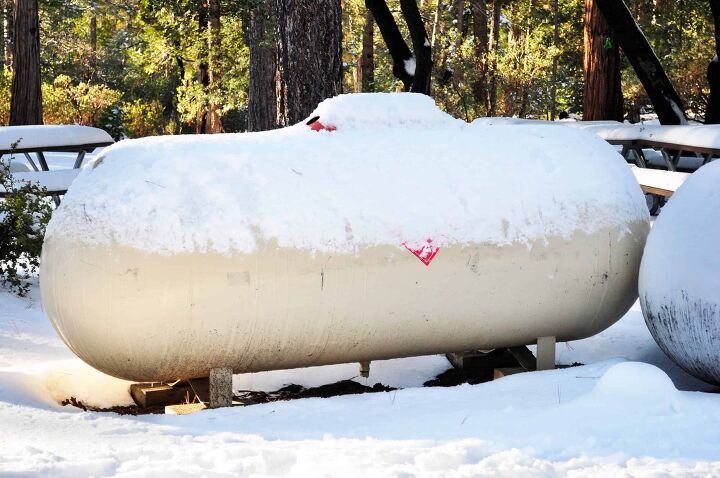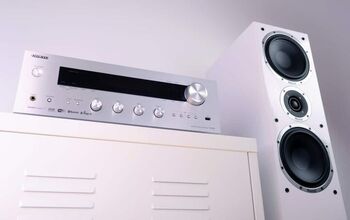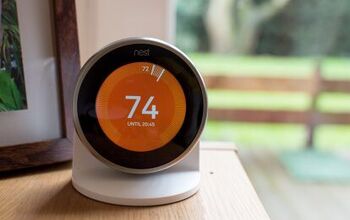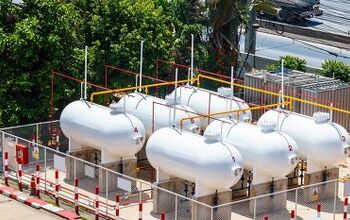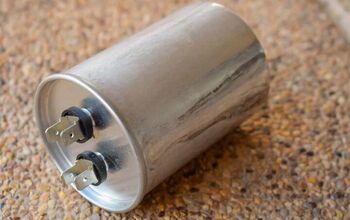Can Propane Tanks Freeze? (Plus Tips to Avoid It)

Propane makes for an effective way to heat your home and is often times found in service areas that are out of reach of traditional natural gas companies. There are issues that can arise with a propane tank, though, and you should be aware of their causes and fixes.
During the winter especially, there are problems that can occur with your propane tank. Propane tanks can freeze up during the winter even while being used. This is generally a sign that the propane is being fed from the regulator too quickly.
Being able to recognize the signs that something is wrong can lead you to a quicker fix. This includes freezing as well as other potential issues that can arise with your propane tank during the colder months of the year.
Can Your Propane Tank Freeze?
Yes, a propane tank can freeze during the winter months even when you are using it. While it can be a major inconvenience to have your propane tank freeze up, it isn’t particularly dangerous. The downside is that you can be left without propane until you can get the tank unfrozen.
In conditions of extreme cold, there may not be adequate vapor pressure throughout your tank. This is what keeps the entire system working the way that it is meant to work. The colder that it gets outside, the lower the overall pressure in the tank will be.
Avoiding Low Pressure
Thankfully, this is an issue that has come up time and again in the past and can be remedied with a little preventative maintenance. You can use these methods to keep the pressure flowing into your propane tank, assuring that you have adequate propane access throughout even the coldest months of the year.
Tips to Avoid Low Pressure
The first thing that you can do to keep your tank full is by refilling it when it gets to around 20% full. Letting it get lower means less pressure in the tank and a greater opportunity for the tank itself to wind up freezing.
Also, never try to cover up the tank. All this does is keep the propane that is inside of the tank insulated from any natural heat that it may get during the daytime. This can actually make your pressure or freezing problem worse.
You also don’t want to let excess snow build up on the tank. For the same reason that you wouldn’t want to cover the tank yourself, the excess snow can keep the propane inside from getting the necessary heating that the sun will provide.
Keep Your Tank Warmer
A great way to keep your tank from freezing – aside from the more expensive route of keeping it as full as you can as often as you can – is to look into installing a heating system. Even when you are running low on propane, the heating system will keep the tank from freezing in even the most inclement of weather situations.
The key is to find a heating method that is safe and can keep your tank from becoming too cold. It is also important to know how much wattage is necessary to get the desired or required PSI levels out of your propane tank.
Never Ever Use Open Flames
It might seem like an obvious statement, but when you are looking for a heating solution for your propane tank, never, ever use open flames. Propane is extremely flammable and heating it with a flame can be incredibly dangerous.
You should also avoid any kind of product that isn’t temperature controlled. A propane tank that overheats can lead to a pressure valve blowing. When the pressure valve blows, that can cause a leak in your tank that can be extremely hazardous if not addressed in shorter order.
When Will a Propane Tank Freeze?
Propane has a freezing point of -44 degrees Fahrenheit. Generally speaking, it is quite unlikely to experience temperatures that low in most parts of the country, although it isn’t out of the realm of possibility.
Still, your main concern isn’t the propane itself freezing. It is the tank itself that can freeze and keep you from getting the propane that you need. Again, that absence of pressure in your tank is what leads to the freezing.
And like all other liquids, propane will expand when it is hot and contract when it is cold. So, whenever the temperature drops, the overall volume that is in your tank will shrink, too. When there is less propane in the tank, that will cause a drop in pressure.
Keep Your Thermostat Down
While the end goal is to keep your home as warm and comfortable as you can, it can also wind up being a major reason that your propane tank freezes. When you run the furnace at compacity on a constant basis, you don’t give the tank the time that it needs to build up more pressure.
When this happens, the overall performance of your propane tank will suffer and, if it freezes, could stop putting out propane at all. Try to give your tank the time that it needs to build up adequate pressure. It may be tempting to crank the heat up but doing so on a regular basis can actually wind up being more detrimental than good.
Perform Snow Cleanup
Though covered briefly above, snow can be a major factor in the freezing of propane tanks. This is not only due to the fact that snow is obviously cold, it is also due to the fact that it can restrict outside heat from getting to your tank.
Make sure that you avoid using homemade and commercial heating blankets as they will not function well with the snow and could potentially make the problem worse. Hassle as it may be, perform regular cleaning of your tank to ensure that snow cannot build up on the outside.
Be Mindful of the Temperature
While you are unlikely to completely ignore drops in temperature, you will have to be more keenly aware of them when you own a propane tank. Especially when the temperature hits extreme lows, you don’t want to find yourself in a position of having no access to propane that keeps your home warm.
Make sure that you check for snow buildup after a fresh snow. Keep constant tabs on the level of your propane to ensure that you don’t get to below 20% where most freezing will occur. And generally just keep an eye on your propane tank to ensure that it is operating properly and optimally.
If Your Tank Has Frozen
If the tank has frozen, it is recommended that you call in a professional. Unfreezing the tank naturally may take more time than you are comfortable with and it can be too easy to further damage the tank if you don’t know what you’re doing.
The key is to get your tank bank into working order as quickly as you can. When the weather starts to drop, it can be more than an inconvenience to not have the proper heating that you need. Make sure that your tank stays functional all through the winter and keep it from freezing up due to low pressure or lower temperatures.
Do not attempt any do-it-yourself solutions as it could lead to damage to the tank, the pipes, and other areas of the system. This will result in not only an expensive repair or replacement but could be potentially dangerous as well. Take proper precautions at all times to ensure that the propane does not leak out.
Preventative Measures
There are plenty of preventative measures that can be taken to keep your propane tank from freezing. Using a little common sense in tandem will ensure that on even the coldest of days your propane tank works the way that it was meant to.
Taking these preventative measures will save you on repair or replacement costs in the long run. Besides, going without heat in the winter is the least optimal situation and is something that can be easily avoided with the proper knowledge and preventative maintenance.

Ryan Womeldorf has more than a decade of experience writing. He loves to blog about construction, plumbing, and other home topics. Ryan also loves hockey and a lifelong Buffalo sports fan.
More by Ryan Womeldorf



